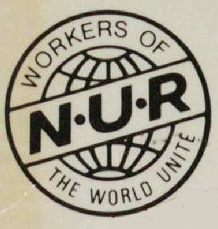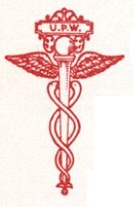Related Research Articles

Henry Fawcett was a British academic, statesman and economist.

The National Union of Railwaymen was a trade union of railway workers in the United Kingdom. The largest railway workers' union in the country, it was influential in the national trade union movement.
The Miners' Federation of Great Britain (MFGB) was established after a meeting of local mining trade unions in Newport, Wales in 1888. The federation was formed to represent and co-ordinate the affairs of local and regional miners' unions in England, Scotland and Wales whose associations remained largely autonomous. At its peak, the federation represented nearly one million workers. It was reorganised into the National Union of Mineworkers in 1945.

The Association of Professional, Executive, Clerical and Computer Staff (APEX) was a British trade union which represented clerical and administrative employees.

The Union of Communication Workers (UCW) was a trade union in the United Kingdom for workers in the post office and telecommunications industries.

The Modern Records Centre (MRC) is the specialist archive service of the University of Warwick in Coventry, England, located adjacent to the Central Campus Library. It was established in October 1973 and holds the world's largest archive collection on British industrial relations, as well as archives relating to many other aspects of British social, political and economic history.

The American Postal Workers Union (APWU) is a labor union in the United States. It represents over 200,000 employees and retirees of the United States Postal Service who belong to the Clerk, Maintenance, Motor Vehicle, and Support Services divisions. It also represents approximately 2,000 private-sector mail workers.

The Communication Workers Union of Australia is a trade union in Australia. It is a division of the Communications, Electrical and Plumbing Union of Australia.
The Postal and Telegraph Clerks' Association (PTCA) was a trade union in the United Kingdom for workers in the post office and telecommunications industries.
The National Union of General Workers (NUGW) was an early general union in the United Kingdom, the most important general union of its era.

The Amalgamated Society of Boilermakers, Shipwrights, Blacksmiths and Structural Workers (ASB) was a trade union in the United Kingdom. Many of its members worked in shipbuilding, in which industry it was the leading trade union, while over time it also developed strength in engineering and construction.

George Harold Stuart-Bunning (1870–1951), born George Harold Stuart, was a British trade unionist.
The United Textile Factory Workers' Association (UTFWA) was a trade union federation in Great Britain. It was active from 1889 until 1975.

Sir John William Bowen CBE, known as William Bowen, was a British trade unionist and politician.
The Postmen's Federation was a trade union representing postal workers in the United Kingdom.
Wallace Bligh Cheesman was a British trade union leader and political activist.
Edith H. Howse was a British trade unionist and politician.
The United Kingdom Postal Clerks' Association was a trade union representing post office workers in the UK.
Harry Dubery was a British labour movement activist.
Leeds Trades Council is an organisation bringing together trade unionists in Leeds, in northern England.
References
- 1 2 3 4 Marsh, Arthur; Ryan, Victoria (1980). Historical Directory of Trade Unions. 1. Farnborough: Gower. p. 86. ISBN 0566021609.
- ↑ The Labour Who's Who 1927. London: The Labour Publishing Company. 1927. p. 39.
- ↑ Sumeray, Derek; Sheppard, John. London Plaques. Shire Publications.
- ↑ Clinton, Alan (1984). Post Office Workers: A Trade Union and Social History. London: George Allen and Unwin. p. 643. ISBN 9780043310861.
- 1 2 3 4 5 6 7 8 9 10 11 12 13 14 15 16 Clinton, Alan (1984). Post Office Workers. George Allen and Unwin. ISBN 0043310869.